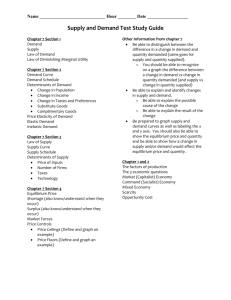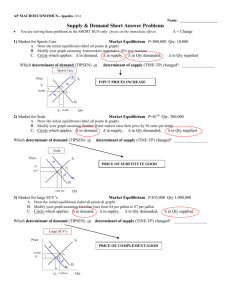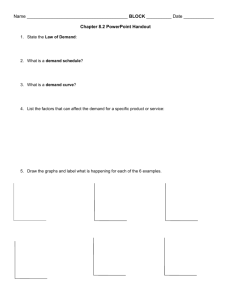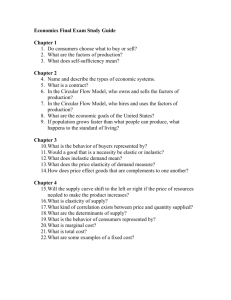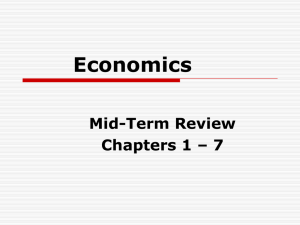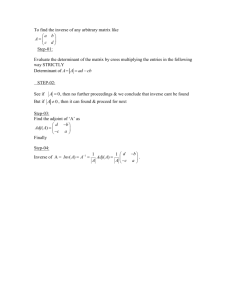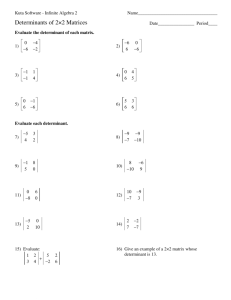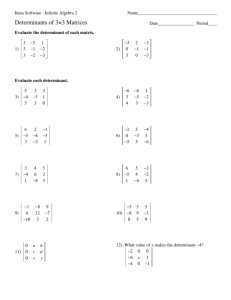Study Guide--Housing Bubble, Supply & Demand
advertisement
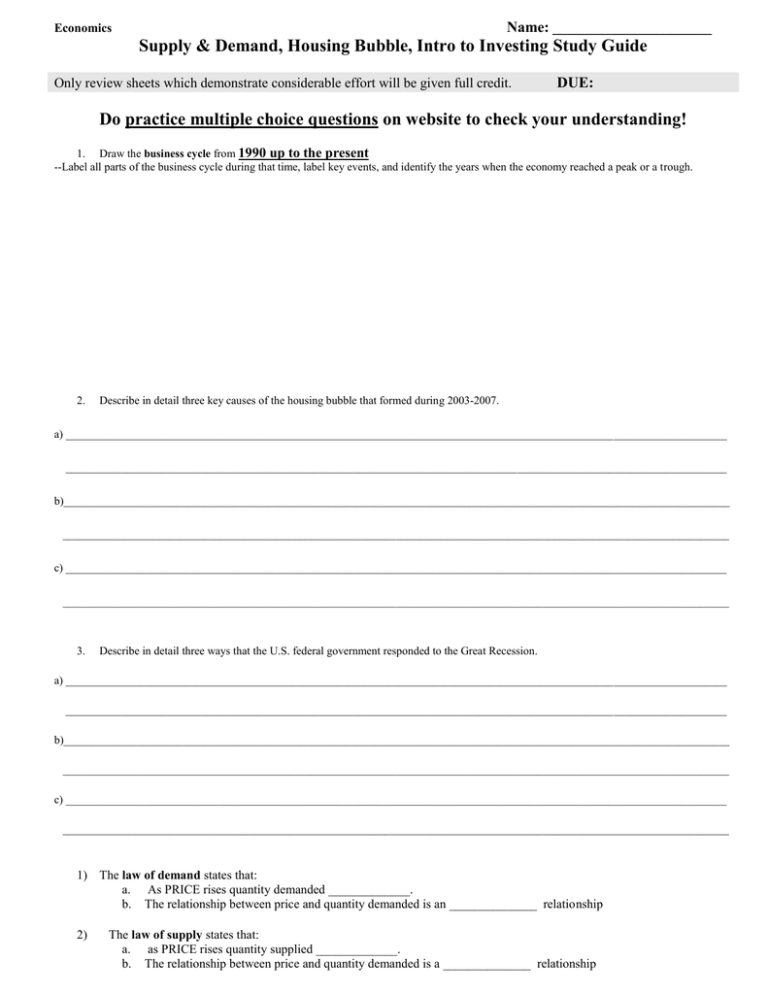
Name: _______________________ Economics Supply & Demand, Housing Bubble, Intro to Investing Study Guide Only review sheets which demonstrate considerable effort will be given full credit. DUE: Do practice multiple choice questions on website to check your understanding! 1. Draw the business cycle from 1990 up to the present --Label all parts of the business cycle during that time, label key events, and identify the years when the economy reached a peak or a trough. 2. Describe in detail three key causes of the housing bubble that formed during 2003-2007. a) _____________________________________________________________________________________________________________________ _____________________________________________________________________________________________________________________ b)______________________________________________________________________________________________________________________ ______________________________________________________________________________________________________________________ c) _____________________________________________________________________________________________________________________ ______________________________________________________________________________________________________________________ 3. Describe in detail three ways that the U.S. federal government responded to the Great Recession. a) _____________________________________________________________________________________________________________________ _____________________________________________________________________________________________________________________ b)______________________________________________________________________________________________________________________ ______________________________________________________________________________________________________________________ c) _____________________________________________________________________________________________________________________ ______________________________________________________________________________________________________________________ 1) The law of demand states that: a. As PRICE rises quantity demanded _____________. b. The relationship between price and quantity demanded is an ______________ relationship 2) The law of supply states that: a. as PRICE rises quantity supplied _____________. b. The relationship between price and quantity demanded is a ______________ relationship 3) Draw a properly labeled supply/demand graph for T-Shirts with a market equilibrium = Price: $3.00 Qty 1,500 Label each axis of the graph, both curves D1 & S1, and equilibrium (E1) Price Qty 4) Explain the difference between a change in demand and a change in quantity demand? a. Please understand this—it will be extremely helpful when taking the test! _________________________________________________________________________________________________ _________________________________________________________________________________________________ 5) List the 5 determinants of demand? (hint: Write out the acronym to start) _________________________________________________________________________________________________ 6) Whenever a determinant of demand changes you know the demand curve must ______________________. 7) Draw a demand curve only and shift it for the following changes : a. Label curves D1 and D2 respectively Income increases Substitute price decreases Complement price decreases 8) What is the difference between a change in supply and a change in quantity supplied? a. Please understand this—it will help a lot on the test….. _________________________________________________________________________________________________ _________________________________________________________________________________________________ 9) List the 3 determinants of supply? (hint: Write our the acronym to start) _________________________________________________________________________________________________ 10) Whenever a determinant of supply changes you know the supply curve must ______________________. 11) Draw a supply curve only and shift it for the following changes : a. Label supply curves S1 and S2 respectively Input Costs increase Technology increases New firms enter market 12) Draw the market for Apples in equilibrium at price = $100 and quantity = 10,000. What situation occurs if the government sets a price ceiling at 0.50 cents. Draw the price ceiling on your graph and explain the affect this has on the current market equilibrium Price Qty Who benefits and who loses from this ceiling? What would happen if the price ceiling was set at $2 00 _________________________________________________________________________________________________ _________________________________________________________________________________________________ 13) Explain the effect of a government price floor above the market equilibrium for Corn in the graph below. Draw in the price floor and explain the effect CellCorn Phones $100 Explanation: S1 Price ---------------- ----------- E1 1 million D1 Qty 14) Give an example of two products which are complements. ____________________________________ 15) Give an example of two products which are substitutes? ____________________________________ 16) List 3 factors which determine a good’s elasticity: _____________________________________________ __________________________________________________________________________________________ 17) Draw a demand curve for an elastic good and an inelastic good below. a. Now draw a point P1 & Q1 on each graph and then a second higher price at P2 and Q2 Elastic Demand Curve Inelastic Demand Curve 18) Notice that the quantity demanded on the inelastic goods changed by LESS than on the elastic graph. Explain why this occurred: __________________________________________________________________________________________ __________________________________________________________________________________________ 19) Sample question: If the price of good A increases and demand for good B decreases, then good A & B are: a. Inelastic goods b. elastic goods c. substitutes d. complements Explain your answer to the above question: _________________________________________________________________ __________________________________________________________________________________________ __________________________________________________________________________________________ 20) If price rises by 20% on an ELASTIC GOOD you know that quantity demanded must fall by ______ than 20%. 21) If price rises by 20% on an INELASTIC GOOD you know that quantity demanded must fall by ______ than 20%. 22) What is the formula for total revenue: _________________________________ 23) What is the formula for profit. _________________________________ 24) What happens to total revenue when prices rise on inelastic goods? Explain why this is true: __________________________________________________________________________________________ __________________________________________________________________________________________ 25) What is a share of stock? ____________________________________________________________________________ 26) What is a bond and why would a person buy one? ________________________________________________________ 27) Compare and contrast stocks and bonds as investments: ____________________________________________________ _________________________________________________________________________________________________ _________________________________________________________________________________________________ _________________________________________________________________________________________________ 28) What are the three main stock indices and what does each one measure? a) ____________________________ -- ________________________________________________________________________ b) ____________________________ -- _______________________________________________________________________ c)_____________________________ -- _______________________________________________________________________ 29) What is the definition of A “large cap” stock? ______________________________________________________________ A mid-cap stock _______________________________________________________________ A small-cap stock ______________________________________________________________ 30) What is the most recently reported Unemployment Rate _______ Federal Funds Rate _______ GDP Growth Rate ______ Jobs Growth # ____________ 22) What are externalities and how do they reduce efficiency? ________________________________________________________________________________________________ ________________________________________________________________________________________________ ________________________________________________________________________________________________ 23) Give two examples of negative externalities: 1. ______________________________________________________ 2._____________________________________________________________________ 26) List 2 methods in which the government can reduce the negative impact of externalities a) ________________________________________ b) _______________________________________________ 27) Negative Externalties lead society to (overproduce, underproduce) a product. (circle one choice) 28) What are three positive aspects of Wal-Mart? 1. _____________________________________________________________ 2.___________________________________________, 3. __________________________________________________ 29) What are three negative aspects of Wal-Mart? 1. _____________________________________________________________ 2._________________________________________, 3. ________________________________________________ 30) What are two competitive advantages that Wal-Mart has created for itself? 1. _______________________________________________, 2. _______________________________________________ 31) What are zoning laws, and how have they been used against Wal-Mart? ____________________________________________ _______________________________________________________________________________________________________ Short Answer Section: . Be able to draw the business cycle from 1990 up to the present, including labeling all parts of the business cycle during that time, labeling key events, and identifying the years when the economy reached a peak or a trough There will be 8 Supply & Demand graphing problems Be able to identify what type of change has occurred—a price change, a change in demand (TIPSE), or a change in supply (TIN)—be able to shift the appropriate supply or demand curves if applicable, and be able to specifically identify which determinant of Demand or Supply has changed, if one has. Also, be able to understand the difference between a price floor and a price ceiling and to explain how price ceilings or floors affect market equilibrium. Directions: Understand that we are solving these problems in the SHORT RUN. What is the immediate effect of a change in economic circumstances? 1) Draw the initial Supply and Demand Curves. Label them S1 and D1 respectively. Label Equilibrium E1 2) Label the Equilibrium Price and Quantity [based on information provided] NEXT: 3) Determine what changes with the introduction of situation A 4) If there is a change in price then draw in the new price (P2) and demonstrate what happens to equilibrium. If there is a change in demand or supply, state the exact determinant of Supply or Demand that caused either curve to shift (TIPSE or TIN) 5) Label any new supply/demand curves S2 or D2 respectively. 6) Label the new equilibrium E2, the new equilibrium price P2 and the new equilibrium quantity Q2. 7) Repeat for situation B 1.MARKET FOR ELECTRIC CARS: A. Price of gasoline rises M.E. $30,000/100 cars B.California offers a tax break to car manufacturers who produce an electric car Price Change/ Determinant of Demand/Supply: 2. MARKET FOR SUV’S: M.E. $30,000/100 cars A. Price of gasoline rises Price Change/ Determinant of Demand/Supply: Price Change/ Determinant of Demand/Supply: B. All SUV dealers cut the price of their SUVs to $25,000 each Price Change/ Determinant of Demand/Supply: 3. MARKET FOR FORD EXPLORERS: M.E. $30,000/100 cars A. Wages and income rise for American workers B. Potential buyers postpone purchases until yearend clearance sales begin. Price Change/ Determinant of Demand/Supply: Price Change/ Determinant of Demand/Supply: 4. MARKET FOR LAPTOPS: M.E. $975/100 items A. The price of laptops is reduced to $800. B. Due to recent earthquakes in Asia, memory chips, which are needed to make computers, have become much scarcer and more expensive Price Change/ Determinant of Demand/Supply: Price Change/ Determinant of Demand/Supply: 5. MARKET FOR BEEF PRODUCTS: M.E. $4.00lb/20lbs A. Oprah Winfrey announce on her television B. An energy crisis in California makes it more show that she will no longer eat beef products expensive to process beef. Price Change/ Determinant of Demand/Supply: 6. MARKET FOR PEPSI: M.E. 80cents/100cans A. Pepsi opens new bottling facility with faster, more efficient machinery Price Change/ Determinant of Demand/Supply: Price Change/ Determinant of Demand/Supply: B. Coca-Cola introduces a better tasting and cheaper soda Price Change/ Determinant of Demand/Supply: 7. MARKET FOR SNOWBOARDS: M.E. $200/100 snowboards A. Snowboarding events at the Olympics cause B. Due to increased demand for snowboards, thousands to want to try the sport more snowboard manufacturers enter the market. Price Change/ Determinant of Demand/Supply: Price Change/ Determinant of Demand/Supply:
